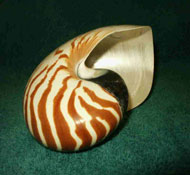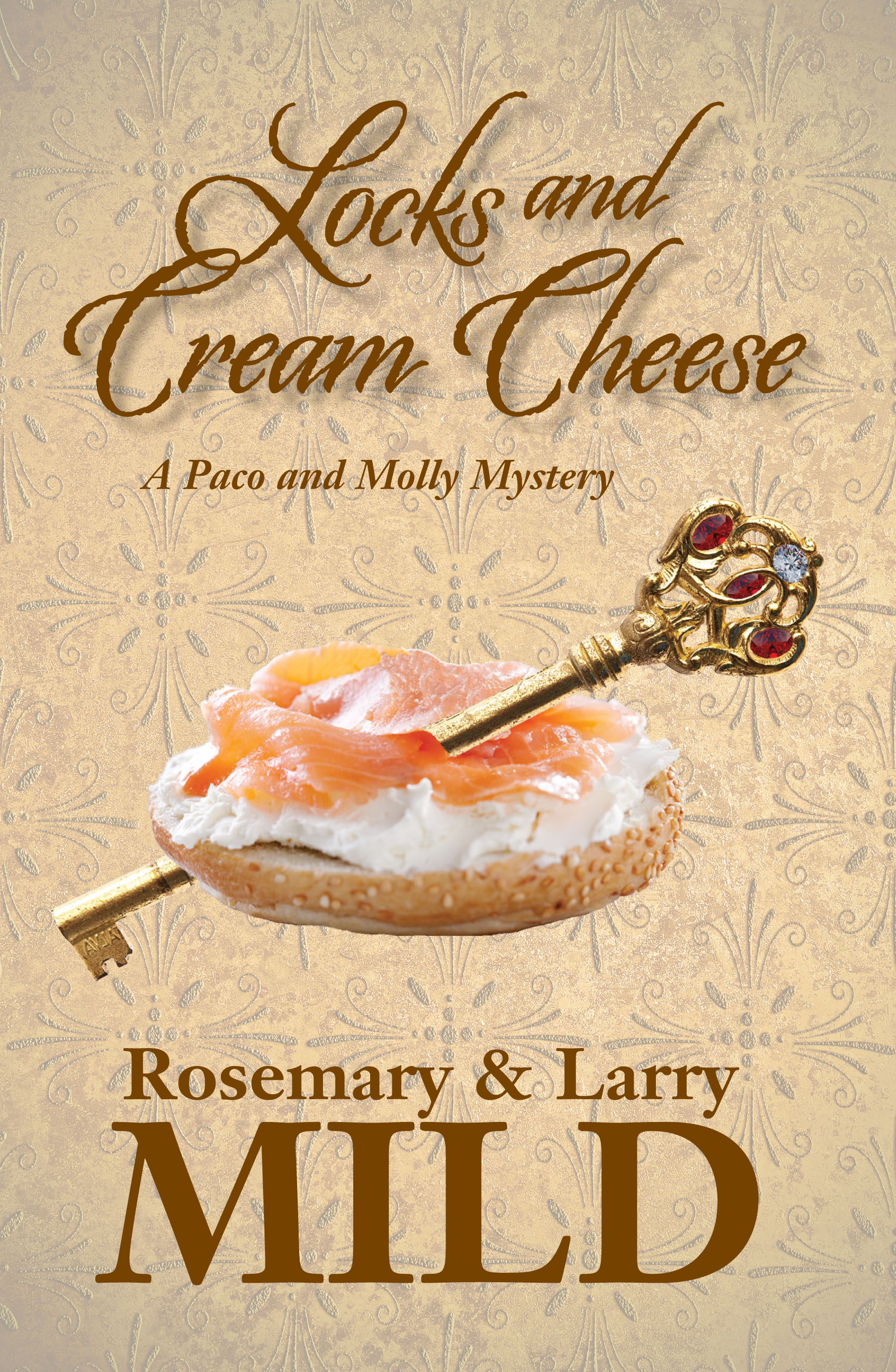 Magic Island Literary Works
Magic Island Literary Works by Larry and Rosemary Mild.
| Home | Select Books From Spread | Authors | Contact Us | Author Interviews | Monthly Blog |
Paco LeSoto, a dapper retired detective, and, Molly Mesta, a witty housekeeper/cook, team up as an endearing pair of sleuths. They encounter murder and mayhem among the residents of Black Rain Corners, a quaint Maryland town on the shores of the Chesapeake Bay. A million-dollar painting and a jeweled antique key disappear from Marche House mansion. Hidden rooms, locked doors, secrets out of the past, and dead bodies embroil the town's elite Historical Society in sizzling scandal. Trapped in the web of suspicion are a psychoanalyst, an alcoholic gambler, a mob enforcer, an iron-pumping gigolo, and an art dealer from the Orient. Paco and Molly expose the mansion's secrets. |
 ISBN:978-0-9838597-4-1. Magic Island Literary Works (2nd Edition) |
To let Larry and Rosemary know what you think of Locks and Cream Cheese
E-mail us at: [email protected]
 |  |
Buy autographed trade paperbacks at author's discount price: |
| Enjoy a sample chapter of Locks and Cream Cheese, A Paco and Molly Mystery | |
Chapter 1
MURDER AT MARCHE HOUSE
Tuesday, October 14, 1980
Four unloaded freighters strained at anchor like Dobermans pulling at leashes. A stark moon chiseled their silhouettes over Maryland's Chesapeake Bay. Gusting breezes coaxed frothy whitecaps from the murky bay surface. Atop a cliff on the western shore, a shadowy figure shrouded in black turned away from churning waters to face the old mansion. The black haversack slipped from a tilting shoulder to the ground. Gloved hands removed a folded grappling hook tied to a length of throwing line. With most of the line coiled in one hand, the other hand spun the hook in a wide circle until the momentum peaked. At that instant, the hook flew to the balcony above, over the rail, bursting open to hang fast on a wrought iron baluster.
The figure yanked hard on the paid-out tether and, after tying the bitter end to the haversack, began to scale the coarse stone wall to the balcony. The lithe frame swung over the broad iron rail one leg at a time and bounced to the floor, freezing all motion, listening like a stalking alley cat. Hearing no sound, the intruder hoisted the haversack of tools to the balcony and moved with them to the double French doors.
A gloved hand slowly tried the ancient brass knobs to coax them open, but the glass-paneled doors were locked. An experienced eye discerned the lack of foil strips on the window panes--an antiquated alarm system at best. The top inside pane of the right-hand door yielded to a sharp wrap with a small peen hammer, allowing the removal of the remaining shards with gloves.
One hand slipped inside the top of the door, locating two small plastic boxes, one above the other. The bottom one, shaped like a candy bar, contained a long, narrow magnet screwed to the door. A gloved hand quickly inserted a wedge of cardboard just large enough to maintain the precise spacing between the door magnet and the second box. This box contained the door frame's magnetically activated switch. The intruder bound the two boxes together with duct tape. A small screwdriver released the two wood screws holding the magnet to the door. A few more quick screw turns freed the switch from the frame above it. The switch and magnet now dangled away from the door and frame, suspended there by the stiff wiring. A long arm reached inside and down to the catch to release one double door from its mate.
The intruder stepped inside and flicked on a flashlight. Its beam revealed a high-ceilinged Victorian room with a canopied four-poster bed. A mahogany highboy filled one corner. The light scanned silk-covered walls, passing over several richly framed oil paintings to settle on one in particular: a turn-of-the-century portrait. The masked intruder pulled a small photograph from a hip pocket and compared it to the stately lady peering out of the frame. It matched perfectly. A toothy smile of relief breached the knit ski mask.
Shedding the gloves and stuffing them into the haversack, deft fingers checked carefully for security devices that might be concealed behind the carved, gilded frame. Discovering none, the figure in black lifted the support wire from its wall pin. The wire provided a convenient means to attach the frame to a pair of rings on the haversack.
The flashlight fit neatly into a pocket. The intruder had taken care to make no noise, and yet a foreign sound floated up beyond the door to the hall, like someone walking on carpet. The footsteps came closer and stopped. The door rattled on its hinges. Its brass knob turned slowly, its movement gleaming in reflected moonlight.
Just twenty minutes earlier, Willard Aigue had opened the front door to the Marche House mansion to make the last of his nightly security rounds. Since old Hubert Marche had died last year, no one lived in the place. Willard and his wife, Norma, served the Marche estate as caretakers, grateful for the perk of living in the three-room cottage at the top of the road.
Willard arrived earlier than usual this night because he wanted to fix the French doors that led from the Missus' bedroom to the balcony. They rattled in the wind, and the loose hinges kept setting off the silent alarm, which was not so silent down at the cottage. It didn't bother him much; he'd simply turned down his hearing aid. But each time it happened, Norma threw a fit for half an hour afterward, and he couldn't rightly blame her. He planned to tighten the hinges tonight and take care of the problem once and for all.
He clipped the ring of house keys to his belt and swung his box lantern around the grand foyer in wide sweeps and then in the direction of the dining room. Working his way cautiously through the dark, silent mansion, he pointed the beam across the expanse of each room, checking windows and doors along the way. Eighteen minutes later, he reached the top of the wide, curved staircase that led from the grand foyer to the second floor.
After checking out the first bedroom, Willard stopped in the hall before the Missus' bedroom. He turned the knob and pushed the door inward. About a quarter of the way open, it met with resistance, and he could push no farther. Startled, he pushed harder. He saw a hand gripping the door from the inside, the thumb curled tightly around the door's edge.
Willard dropped the lantern. Grasping the knob with both hands, he pulled the door shut against the jamb, catching the vulnerable thumb in an unexpected vise.
"Ow! Oh, man, you son-of-a-bitch!" a voice shouted.
Willard pulled the door toward him with the force of all his weight, but the strength of the intruder beyond was too much for his seventy-year-old body, and the knob slipped from his grasp. The towering black figure lunged at him and thrust him backward against the staircase rail. Willard screamed as he felt his body hurled through space, downward, downward....
The thief peered over the railing, but could see nothing in the dense darkness. The flashlight flicked on. The old man appeared grotesquely illuminated in the bright beam. His limbs splayed out, distorted, in crumpled work clothes. Willard lay face up in a widening pool of blood.
The thief, after descending a few of the stairs, decided against taking a closer look, and instead, ran back through the open bedroom door, shouldered the haversack and sprinted for the open French doors. Untying the grappling hook from its tether and using double lengths of its line, the intruder swung from the balcony and rappelled down the stone wall. Once on the ground, the fleeing figure gathered in the line and darted down the stone steps of the cliff to the bay shore road below. The car started quickly and sped off into the night. The painting lay covered and cradled safely on the rear seat.
Willard lay immobile on the marble floor, unaware of either coldness or hardness at first, but acutely aware of pain. It wasn't excruciating pain. It felt more like pressure, except that he couldn't move. He lay there for more than an hour while his body's heat drained out of him. Fear and shivering cold dominated his whole being. He knew full well death awaited him; only a matter of time now. A blurry shadow moved into view. It was a man, one he didn't recognize. And then he heard Norma, but he couldn't turn his head to see her. He wanted to see her. He wanted to live.
"Officer, will he make it?" she asked.
"Don't know, ma'am, but I've got an ambulance on the way. They'll get him to the hospital."
Norma's fearful face appeared suddenly before him. "He's trying to say something. His lips are moving," she said.
The man's face came closer, too. "Sounds like he's saying dumb."
Norma nodded. "That's what it sounds like to me, too."
Willard tried to shake his head. He couldn't move. He rolled his eyes to tell them no, but neither of them understood. His eyes came to their final position and froze there. The police officer took his pulse and shook his head slowly, and Norma knew she had lost her man. She buried her head in Willard's chest and sobbed until the uniformed officer gently pried her loose and led her away.
Willard Aigue was buried four days later.
| Read outstanding reviews ofLocks and Cream Cheese, A Paco and Molly Mystery | |
Mystery Loves Company, Bookstore
Reviewed by Kathy Harig
Reviewed by Kathy Harig
"Locks and Cream Cheese is a one-of-a-kind upstairs-downstairs story, and it happens here on the Chesapeake Bay. I loved the book."
Masters and Maestros
Reviewed by Donna Brown
"Move over, Agatha Christie. The Milds have taken over! Locks and Cream Cheese is an extraordinary read."
The Capital
Article by Mike Unger
"If the early reviews are any indication, Locks and Cream Cheese is destined for success, along with the Milds themselves."
Amazon.com Book Reviews
Reviewed by Maura Kennedy
Review Stars FIVE STARS "A terrific read. Rosemary and Larry Mild take the reader through an enjoyable, mindbending potboiler of a mystery. The characters are extremely vivid and likeable, and the classic locked-door corpse story finds a totally new twist."
The Washington Post
Article by Sandra Travis-Bildahl
"Finishing Each Other's Sentences Whether Conversing or Writing, Late Blossoming Couple Find Joy Whenever They Collaborate."
| Go to top of page | |